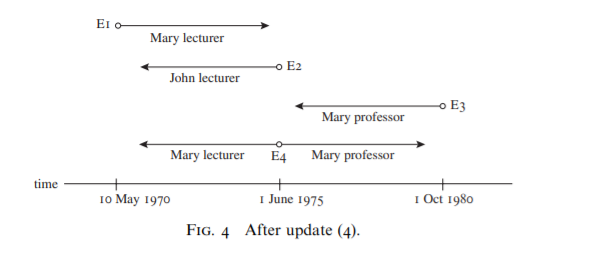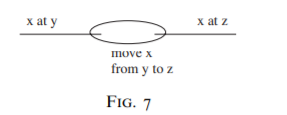目录
- New Generation Computing 1986
- https://www.doc.ic.ac.uk/~rak/papers/event calculus.pdf
- use formal logic to formalize the notion of time (Horn clause subset of classcal logic)
1 Introduction
- situation calculus, global
- event calculus, local events and time periods
2 A Simplified Example
- hire, left, update, knowledge
- figure
![image]()
- sometimes, the end of a period
after(e)(eis a certain time instant) is undifined but might be determined by means of additional information later - end of lectureship, begin of professorship
- proof after(\(E_1\)) = before(\(E_4\)), i.e. combine "*-- and --*" to "*--*"?
- *--*--* structure, "complete"
- derived by a rule expresses ... 'cannot': negation, non-monotonic
![image]()
- another rule
![image]()
- aim to find Mary's rank at a time instant using the mentioned rules.
- general characteristics of the EC approach
- add, not delete ("no longer"? we explicitly show the end)
- in contrast, conventional database systems, arbitrary.
- EC: an extra level of semantic structure (inductive bias)
- Past and Future are treated symmetrically. independent of the order. incomplete, with new knowledge, with hypothetical possibilities.
- conventional: integrity constraint, statement
- relative ordering, numerical? not essential.
- concurrent
- duration, now pictured
![image]()
- not wholly contained
- equivalence preserving, PROLOG
- situation calculus, global, frame problem, computationally inefficient. EC: local, different names even if they have the same duration
- periods rather than on time instants
- sacrifice conciseness for expressiveness, modal logic
- add, not delete ("no longer"? we explicitly show the end)
3 The Promotion Example in Detail
- an exemplar rule: Rank(person, position, after(instant)) if Hire(person, position, instant)
- assume complete now (even though an incomplete description would be more natural)
- general rule, same rank, <, not disjoint, "Temp" means domain specific.
- axiom: same relationship: identical or disjoint
- disjoint: < or =!
- rule for the notion of disjoint
- end, start, same, sabattical (so the notion of disjoint contains '=')
- interpret the negative condition?
4 Execution of the Promotion Example
- PROLOG, infinite
- try to solve..., so try to solve..., loop
- intelligent solver or transformation techniques
5 Incompleteness and Incorrectness of Start and End
- Negation by failure is a form of the closed world assumption, that the "knowledge base" is complete:
not p is judged to hold if all ways of showing p fail
- start, end, incomplete, incorrect
- some event, not reported, occured
- rely on the completeness of 'start' and 'end', incorrect
- additional rule, solve the incorrectness before incompleteness
12 Conclusion
- events, primitive
- conflict, non-monotonically withdrawn
- conventional: reject. only appropriate when ordered
- extension, "Mary was a professor when Jim was promoted"






